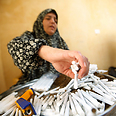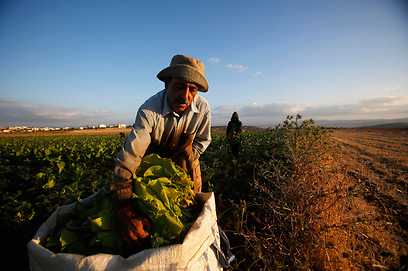
From planting, drying and rolling, the local cottage industry has put dozens of whole families to work and has defied high levels of unemployment and poverty.
But pressures on their business are growing. Tobacco production and other parts of the rural economy, which have long eluded formal government regulation, are coming under the radar of the Palestinian Authority (PA) as it seeks to bolster its revenues and alleviate a massive debt burden.
In recent months the PA has begun clamping down on farmers who package and sell hand-rolled cigarettes around the villages, accusing them of smuggling and has even begun arresting some workers.
While the government maintains that building a modern economy depends on the rule of law, its critics say the moves to stamp out black market trading is another example of the state-in-waiting's failure to implement policies that protect jobs and help pull Palestinians out of poverty.
"We've triumphed over joblessness," said farmer Mohammed Amarnih, 65, adding that tobacco cultivation had brought unemployment in several local villages down to near zero.
"The government has given us no alternative to this work, so (this is the only way) we can live a normal life in dignity," he complains.

Workers harvest tobacco leaves near Jenin (Photo: Reuters)
Former Prime Minister Salam Fayyad, who left office this month, struggled to counter rising poverty and unemployment rates, which are both now at around 25%. He resigned after widespread complaints over his handling of the economy and soaring costs of living.
A new government is now in place, and in a meeting with reporters last week, Mohammed Mustafa, the deputy prime minister in charge of financial affairs, called the social challenges "very scary."
"We are reviewing the economic policies of the last government to improve our citizens' situation and lighten the burden they're carrying," Mustafa said.
The Palestinian Authority, which exercises limited self-rule in the West Bank under interim peace accords with Israel, will boost revenue by ensuring countries deliver pledged aid money - and enforcing tax collection, Mustafa said.
But he acknowledged that 70% of PA revenues come from sources it cannot control, whether from abroad or at its own borders where Israel collects customs duties on the PA's behalf. Israel has withheld the transfers during times of dispute with the Palestinian government.
Israeli curbs
For years, the PA has sought to put in place political and economic institutions ready for a long-sought independent Palestinian state, but has run up against Israeli control over land, water, internal movement of people and foreign trade.
The curbs, along with unpaid utility bills at refugee camps and often uncollected customs duties at borders beyond PA control, have added to a government debt of $4.2 billion. That equals 40% of gross domestic product and dwarfs the annual budget of $3.8 billion.
Palestinian youth unemployment stands at 40%.
Outside his native village of Ya'abad, 22-year-old Nouredeen Atatra and his fellow tobacco farmers form a row of four following behind a tractor towing a home-made tiller digging holes and sprinkling water into the dry earth.
They bend down, scooping soil around feeble new plants.
"I have a university degree in political science, but there are no jobs out there," said Atatra, a slim man with a mud-spattered red-and-white checked scarf wrapped around his head.
On the road, lined with concrete Israeli watch towers, a gleaming new bus carrying Israelis to the nearby Jewish settlement of Mevo Dotan whizzes past, escorted by an army jeep.
"For generations my family worked this land and there's no shame in being a farmer. But if the government doesn't even allow us to do this, then we're afraid the land will be abandoned, and the settlers will someday take it," Atatra said.
The PA has said the tobacco must be sold only through legitimate channels.
Farmers claim the PA is trying to curb their sales even to legitimate companies because it wants cigarette companies to import more tobacco as that would boost customs revenues.
The poor economic situation only enhances the appeal of cheap local tobacco.
Around a quarter of Palestinian adults smoke, according to official statistics, and many find 25 shekels ($7) per pack for international brands like Marlboro far too pricey.
At just 4 shekels ($1.10) a pack, cigarettes from Ya'abad and the surrounding villages are much more affordable.
Analysts say officials could do more to ease the financial strain on ordinary Palestinians.
"Yes, the government lacks sovereignty and control over trade and monetary policy. But it does have some power in fiscal policy, over whom to tax and where to spend. It has not properly protected the most vulnerable citizens while income inequality rises," independent economic analyst Nasser Abdul Kareem said.
"The (Fayyad) government deserved some blame for this situation. It should have helped redistribute wealth and combat the marginalisation of farmers and manufacturers," he said.
A boom in the services and construction sector fuelled by foreign aid saw GDP surge 9% in 2010. But the World Bank projects growth in 2013 of just 5% as government debts to private companies pile up.
'Arab Spring' from a cigarette
Sitting on a patio draped in purple bougainvillea, farmers roll up cigarettes in hands calloused by a lifetime of hard work, and grumble at officialdom.
"They're so used to getting foreign aid that they forgot what we can achieve by ourselves," said Abu Ayman, puffing a pungent cloud of smoke into the crisp village air.
"What else can you expect from the Oslo gang?" another chimes in, referring to the interim peace deals signed with Israel in the 1990s. Many Palestinians blame the accords' economic annexes for their hamstrung growth.
The Jerusalem Cigarette Co., a publicly traded firm operating out of an industrial zone east of Jerusalem, is a leader in the Palestinian tobacco sector and endures heavy taxes on cigarette sales, which are as high as 9.5 shekels ($2.6 dollars) per pack, almost two-thirds their retail cost.
But villagers, who supply hundreds of tons of tobacco to the company annually, say that Jerusalem Cigarette buys less than half of the local tobacco harvest as the government encourages it to import foreign tobacco, leaving them no choice but to sell their excess product on the black market.
"There's no parliament to officially represent our views, and the prime minister used to make policies by decree," said Saleh Jamel, head of the council of Zabdeh village charged with coordinating local agriculture policy with the government.
After the Islamist group Hamas won national polls in 2006, Palestinians fought a brief civil war which saw the new parliament mothballed. Municipal elections are also blighted by the partisan split, deepening the paralysis in policymaking.
Growing red in the face, Jamel pounds his fist on a table.
"People can only take getting pushed into poverty so much. If the government doesn't let up, the youth could lose patience and the Arab Spring could come here from a cigarette!" he shouted, stab















